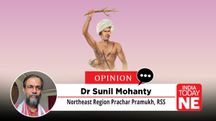Zubeen: A Voice That Grew Into a Landscape
Certain presences become part of a place not through intention, but through an unfolding that feels almost organic. Over the decades, Zubeen Garg’s voice has taken root in Assam in precisely this way. It drifts across dawn-lit roads, hums through crowded marketplaces, settles into the quiet corners of homes, and rises effortlessly during moments of collective celebration. His music has slipped into the region’s memory, travelling beside people as they move through both the uneventful and the unforgettable.

Certain presences become part of a place not through intention, but through an unfolding that feels almost organic. Over the decades, Zubeen Garg’s voice has taken root in Assam in precisely this way.
It drifts across dawn-lit roads, hums through crowded marketplaces, settles into the quiet corners of homes, and rises effortlessly during moments of collective celebration. His music has slipped into the region’s memory, travelling beside people as they move through both the uneventful and the unforgettable.
This intimacy, however, often makes it easy to overlook the intricacies of his journey. When a voice becomes woven into the rhythm of daily life, the story of the person behind it can seem distant. Zubeen’s path has never been tidy. It has swung between extraordinary creative bursts and spells of restlessness, between instinctive exploration and determined discipline. His refusal to fit neatly within a single role or tone has shaped not only the evolution of his work, but also the nature of his presence in public life.
What distinguishes him is not simply his popularity, but his ability to expand the contours of Assamese music. At a time when global influences began reshaping regional tastes, he created songs that absorbed the new without abandoning the familiar. His compositions carried modern sensibilities while remaining attentive to the emotional timbre that defines Assamese culture. In doing so, he helped listeners navigate their own transitions—youth stepping into urban aspirations, families straddling old and new worlds, individuals learning to reconcile inherited identity with modern pace.
Also Read: The Unquiet Question: Identity and Belonging in Today’s Assam
Yet his significance lies as much in the connection people formed with him as in the music itself. The region embraced him with an intimacy rarely afforded to public figures. His voice accompanied milestones and everyday routines, becoming a companion across seasons of life. Over time, affection deepened into expectation. People looked to him for steadiness, for reassurance, for a sense of cultural continuity. The warmth that surrounded him also created a certain weight—a quiet pressure to remain perpetually available and emotionally present.
This delicate relationship reveals both the tenderness and the tension inherent in deep-rooted public affection. Every gesture, withdrawal, or expression from him has been met with intense attention, not out of mere curiosity, but from a place of attachment. He has been expected to speak for many, to stand with many, to reflect the emotions of many. Yet creativity is rarely sustained under the demand for constancy. To continue creating meaningfully, an artist must be allowed the space to evolve, falter, retreat, and return. Zubeen’s life has often echoed this truth: the qualities that make an artist beloved can also make him vulnerable.
One of the most enduring aspects of his career is his instinctive generosity toward younger musicians. Long before “industry support” became a formal expectation, he offered encouragement and mentorship with disarming ease. In a musical ecosystem still finding its structural footing, his accessibility has played a defining role—opening pathways, sharing stages, lending confidence. His willingness to nurture new voices reflects an understanding that culture flourishes through collective effort, not solitary brilliance.
Meanwhile, Assam itself has been undergoing transformation. Digital platforms have widened access, new genres are emerging, and contemporary artists are experimenting with forms once considered unconventional. This expanding tapestry has naturally shifted the position of earlier icons. Rather than overshadowed, Zubeen’s legacy now occupies a foundational place—an anchor point in a landscape that has become richer and more varied. His influence is no longer singular; it is a part of a larger, fluid continuum of expression.
And yet, the emotional resonance of his voice remains undiminished. A familiar line from an old recording can summon entire chapters of someone’s life. His songs have carried exuberance and melancholy, clarity and confusion, rebellion and tenderness. He has never concealed the uneven edges of his personality, allowing the complexity of his inner life to seep into his art. That transparency—sometimes misunderstood—has given his music an honesty that feels increasingly rare.
To understand Zubeen is to acknowledge the full breadth of his journey: the triumphs that drew wide applause, the missteps that exposed his fragility, the reinventions that kept him moving, and the unmistakable sincerity that has shaped his every phase. He defies simple categorisation. He is, at once, composer, performer, mentor, wanderer, and public figure. His trajectory resembles not a line but a river—branching, bending, advancing, retreating, yet always finding its way.
Today, as Assam steps through its own evolving chapters, the relationship people share with him has taken on a more thoughtful form. It rests not on idealisation, nor on the expectation that he carry the full weight of collective emotion. It rests on familiarity—on the knowledge that his voice has accompanied them through shifting times, offering steadiness without insisting on perfection.
In the end, perhaps his most enduring legacy is the quiet continuity he has offered. A presence that has grown alongside the region, adapting as it changed, and allowing itself to be shaped in return. His music, still echoing through both crowded spaces and private ones, remains a gentle reminder that certain bonds in a place’s cultural memory are not forged through spectacle, but through years of sincere, unforced companionship.
That is how Zubeen’s voice became part of Assam’s landscape—steadily, unmistakably, and with an intimacy that feels both natural and lasting.
Copyright©2025 Living Media India Limited. For reprint rights: Syndications Today









